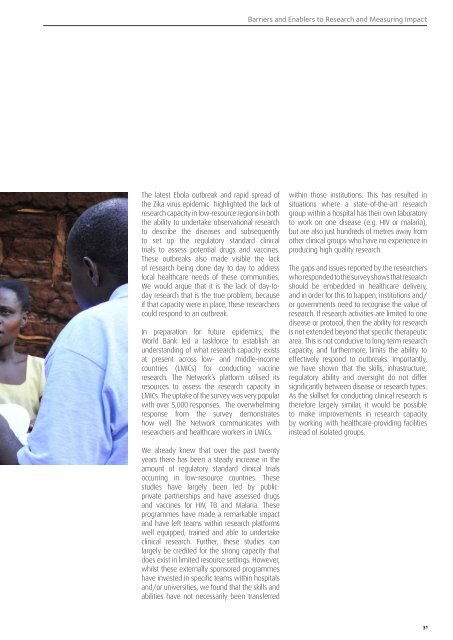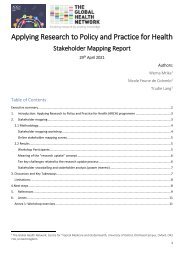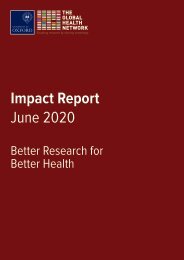The Global Health Network Annual Report 2019
You also want an ePaper? Increase the reach of your titles
YUMPU automatically turns print PDFs into web optimized ePapers that Google loves.
Barriers and Enablers to Research and Measuring Impact<br />
<strong>The</strong> latest Ebola outbreak and rapid spread of<br />
the Zika virus epidemic highlighted the lack of<br />
research capacity in low-resource regions in both<br />
the ability to undertake observational research<br />
to describe the diseases and subsequently<br />
to set up the regulatory standard clinical<br />
trials to assess potential drugs and vaccines.<br />
<strong>The</strong>se outbreaks also made visible the lack<br />
of research being done day to day to address<br />
local healthcare needs of these communities.<br />
We would argue that it is the lack of day-today<br />
research that is the true problem, because<br />
if that capacity were in place, these researchers<br />
could respond to an outbreak.<br />
In preparation for future epidemics, the<br />
World Bank led a taskforce to establish an<br />
understanding of what research capacity exists<br />
at present across low- and middle-income<br />
countries (LMICs) for conducting vaccine<br />
research. <strong>The</strong> <strong>Network</strong>’s platform utilised its<br />
resources to assess the research capacity in<br />
LMICs. <strong>The</strong> uptake of the survey was very popular<br />
with over 5,000 responses. <strong>The</strong> overwhelming<br />
response from the survey demonstrates<br />
how well <strong>The</strong> <strong>Network</strong> communicates with<br />
researchers and healthcare workers in LMICs.<br />
within those institutions. This has resulted in<br />
situations where a state-of-the-art research<br />
group within a hospital has their own laboratory<br />
to work on one disease (e.g. HIV or malaria),<br />
but are also just hundreds of metres away from<br />
other clinical groups who have no experience in<br />
producing high quality research.<br />
<strong>The</strong> gaps and issues reported by the researchers<br />
who responded to the survey shows that research<br />
should be embedded in healthcare delivery,<br />
and in order for this to happen, institutions and/<br />
or governments need to recognise the value of<br />
research. If research activities are limited to one<br />
disease or protocol, then the ability for research<br />
is not extended beyond that specific therapeutic<br />
area. This is not conducive to long-term research<br />
capacity, and furthermore, limits the ability to<br />
effectively respond to outbreaks. Importantly,<br />
we have shown that the skills, infrastructure,<br />
regulatory ability and oversight do not differ<br />
significantly between disease or research types.<br />
As the skillset for conducting clinical research is<br />
therefore largely similar, it would be possible<br />
to make improvements in research capacity<br />
by working with healthcare-providing facilities<br />
instead of isolated groups.<br />
We already knew that over the past twenty<br />
years there has been a steady increase in the<br />
amount of regulatory standard clinical trials<br />
occurring in low-resource countries. <strong>The</strong>se<br />
studies have largely been led by publicprivate<br />
partnerships and have assessed drugs<br />
and vaccines for HIV, TB and Malaria. <strong>The</strong>se<br />
programmes have made a remarkable impact<br />
and have left teams within research platforms<br />
well equipped, trained and able to undertake<br />
clinical research. Further, these studies can<br />
largely be credited for the strong capacity that<br />
does exist in limited resource settings. However,<br />
whilst these externally sponsored programmes<br />
have invested in specific teams within hospitals<br />
and/or universities, we found that the skills and<br />
abilities have not necessarily been transferred<br />
31





